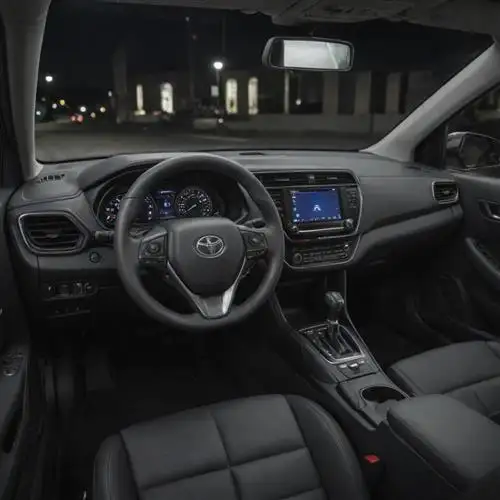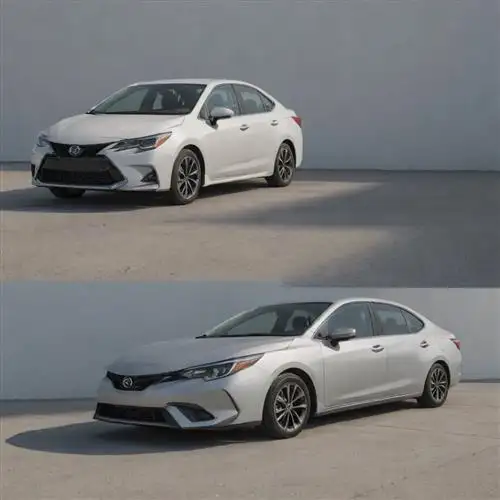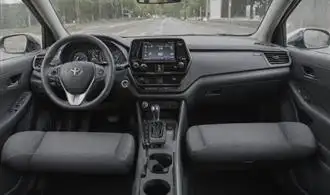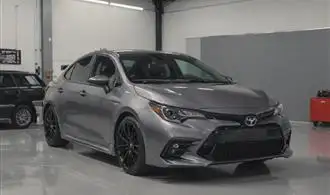
Engine Performance
When it comes to engine performance, the Toyota Corolla and Nissan Sentra offer distinct characteristics that cater to different preferences. The Corolla boasts a 1.8-liter four-cylinder engine that delivers 139 horsepower and 126 lb-ft of torque. This engine, paired with either a continuously variable transmission (CVT) or a six-speed manual transmission, provides a smooth and responsive driving experience, well-suited for daily commutes and city driving. The Sentra, on the other hand, comes equipped with a 1.8-liter four-cylinder engine that produces 124 horsepower and 125 lb-ft of torque. While this engine may not be as powerful as the Corolla's, it still offers a compelling balance of efficiency and performance, making it a viable option for those seeking a more budget-friendly and fuel-efficient compact sedan.
In terms of acceleration, the Corolla generally outperforms the Sentra, with a quicker 0-60 mph time and more responsive throttle response. This can be particularly noticeable when merging onto highways or passing other vehicles. The Corolla's engine also tends to feel more refined and composed, with a smoother power delivery and less engine noise under heavy acceleration.
Fuel efficiency is another important consideration, and both the Corolla and Sentra excel in this area. The Corolla's engine, combined with its CVT or manual transmission, achieves an EPA-estimated 31 mpg in the city and 38 mpg on the highway. The Sentra, with its smaller engine and CVT, offers slightly better fuel economy, with an EPA-estimated 29 mpg in the city and 39 mpg on the highway.
Interior Design and Features
The Toyota Corolla and Nissan Sentra offer distinctly different interior experiences. The Corolla's cabin feels more premium, with higher-quality materials and a more cohesive design. The dashboard layout is intuitive, with controls that are within easy reach of the driver. The infotainment system is user-friendly, featuring a responsive touchscreen and a variety of connectivity options, including Apple CarPlay and Android Auto. The seats in the Corolla are comfortable and supportive, providing ample head and legroom for both front and rear passengers.
In contrast, the Sentra's interior, while functional, feels more basic and utilitarian. The materials used, while durable, lack the same level of refinement as the Corolla. The dashboard design is more traditional, with a slightly cluttered layout that can take some time to get used to. The infotainment system, while packed with features, can be less intuitive to navigate. The seats in the Sentra are generally comfortable, but they may not provide as much support on longer drives.
When it comes to technology features, the Corolla has a slight edge. It comes standard with a range of advanced safety systems, such as automatic emergency braking, lane departure warning, and adaptive cruise control. These features help to enhance the overall driving experience and provide an added layer of confidence behind the wheel. The Sentra also offers a suite of safety technologies, but they may not be as comprehensive as the Corolla's.
Exterior Styling and Dimensions
Safety and Reliability Ratings
The Toyota Corolla and Nissan Sentra are both compact sedans that prioritize safety and reliability, but there are notable differences in their ratings and performance in these areas. The Corolla consistently earns top safety ratings from reputable organizations, including the Insurance Institute for Highway Safety (IIHS) and the National Highway Traffic Safety Administration (NHTSA). The Corolla has received the IIHS Top Safety Pick+ award, the organization's highest accolade, in multiple model years, indicating its exceptional crash test performance and advanced safety features. In contrast, the Sentra's safety ratings, while still respectable, are not as consistently lauded as the Corolla's.
When it comes to reliability, the Corolla has a long-standing reputation for being one of the most dependable vehicles on the market. Toyota's commitment to quality and durability is reflected in the Corolla's track record, with the model frequently topping reliability surveys and studies conducted by organizations like J.D. Power and Consumer Reports. The Sentra has also performed well in terms of reliability, but it does not quite match the Corolla's legendary status in this regard.
Another important consideration is the availability of advanced safety technologies. The Corolla comes standard with a suite of advanced driver-assistance features, including lane-departure warning, automatic emergency braking, and pedestrian detection. These systems can help prevent or mitigate accidents, contributing to the Corolla's overall safety profile. The Sentra also offers similar safety technologies, but the availability and inclusion of these features may vary more depending on the trim level and options selected.
In terms of crash test performance, the Corolla has consistently earned top scores in both front and side-impact tests, demonstrating its structural integrity and occupant protection capabilities. The Sentra has also performed well in crash tests, but the Corolla's ratings tend to be slightly higher, indicating a slight edge in overall safety.
Pricing and Value Proposition
When it comes to the Toyota Corolla and Nissan Sentra, the pricing and value proposition are crucial factors to consider. The base model of the Toyota Corolla starts at $20,425, while the Nissan Sentra's base model begins at $19,510, making the Sentra the more affordable option upfront. However, the Corolla's reputation for reliability, longevity, and resale value often makes it a better long-term investment for many consumers.
The Corolla's starting price does include several standard features that the Sentra lacks, such as a 7-inch touchscreen display, automatic climate control, and a suite of advanced safety technologies. These features can provide added value and convenience for buyers. Additionally, the Corolla's higher resale value means that owners may recoup more of their initial investment when it's time to sell the vehicle.
That said, the Sentra does offer a competitive warranty, with a 3-year/36,000-mile basic warranty and a 5-year/60,000-mile powertrain warranty, compared to the Corolla's 3-year/36,000-mile basic warranty and 5-year/60,000-mile powertrain warranty. This can provide peace of mind for buyers who plan to keep their vehicle for an extended period.
Resale Value and Ownership Costs
When it comes to resale value and ownership costs, the Toyota Corolla and Nissan Sentra differ significantly. The Corolla consistently ranks among the top vehicles in its class for resale value, retaining a higher percentage of its original MSRP over time compared to the Sentra. This is largely due to Toyota's reputation for reliability, durability, and strong brand recognition, which translate to higher demand for used Corollas on the secondary market.
In terms of ownership costs, the Corolla also holds an advantage. Maintenance and repair costs for the Corolla tend to be lower on average, thanks to Toyota's reputation for producing vehicles with high-quality components and engineering. Additionally, the Corolla's fuel efficiency, which is typically better than the Sentra's, can result in lower fuel costs over the life of the vehicle.
Another factor to consider is the cost of insurance. The Corolla's lower repair costs and better safety ratings often translate to lower insurance premiums, further contributing to its lower overall ownership costs. This can be a significant factor for buyers, especially those who plan to keep their vehicle for an extended period.
When it comes to warranties, the Corolla and Sentra offer similar coverage. Both vehicles come with a 3-year/36,000-mile basic warranty and a 5-year/60,000-mile powertrain warranty. However, Toyota's reputation for reliability and customer service may give the Corolla an edge in terms of owner satisfaction and peace of mind during the warranty period.


















